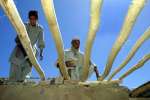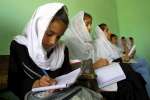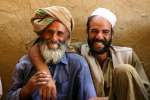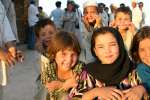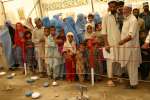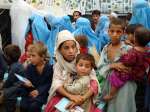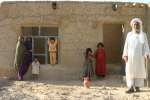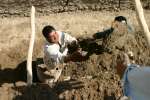- Text size
 |
|  |
|  |
| 
- Français
Millions of Japanese expected to tune in to TV drama about UNHCR
News Stories, 27 May 2009
TOKYO, Japan, 27 May (UNHCR) – Will the dynamic, unusually outspoken Japanese UNHCR office worker Rika win the heart of the handsome American aid worker Ed? Or will he head back to the field to help refugees in Africa?
Japanese public TV broadcaster NHK is betting millions of viewers will tune in to a new drama over the next five weeks to find out – and in the process learn a lot about the UN refugee agency and refugees in Japan as well as around the world.
Beginning this Saturday and running through July 4, the period straddling World Refugee Day, the drama "Plastic Sheeting in the Wind" will be broadcast in prime time on Saturday nights. The drama is based on an award-winning novel of the same name, with acting revolving around UNHCR's Tokyo office, recreated in astonishing detail on a film set in the suburbs of Tokyo.
The main character is a fictional public information assistant named Rika Kudo, played by up-and-coming Japanese actress Kazue Fukiishi.
"I knew about refugee issues from TV news, especially on emergencies, but it was something that I would see as people suffering somewhere far away on the other side of the globe" says Fukiishi, reflecting a widely-held Japanese view.
"During the course of acting as UNHCR staff, I came to know much more about the people who are forced to flee and that there are refugees in Japan and that there is UNHCR – a name slightly difficult for a normal Japanese to pronounce -in Japan, trying to make people's lives much better," she added.
Rika, the ambitious lead character, enters the UN with high hopes of using her job as public information assistant as a stepping stone to improve the world. To her surprise, she falls in love with and marries a UNHCR protection officer, only to part with him after he is reassigned to Sudan. Rika finds fulfillment and gains confidence in herself as she overcomes obstacles and hardships.
The story highlights the opportunities and challenges asylum seekers and refugees face in Japan, as well as the often difficult life of refugees in crowded refugee camps around the world. The dangers facing humanitarian staff working in conflict zones are also dramatically brought home in the series.
On World Refugee Day, June 20, the actors and NHK film crew will join UNHCR and partners in a symposium at United Nations University in Tokyo, site of the real UNHCR office. Under the theme of "No Home, Yes Hope," the actors and directors will talk about how they felt dealing with refugee issues to an audience that is expected to include viewers of "Plastic Sheeting in the Wind."
Japan has been an important supporter of refugees since the major Indochinese influx in the late 1970s and now is UNHCR's third-largest donor. Last year Japan announced that it will become the first Asian country to accept refugees for resettlement under a pilot programme due to start in 2010.
By Yuki Moriya in Tokyo, Japan











